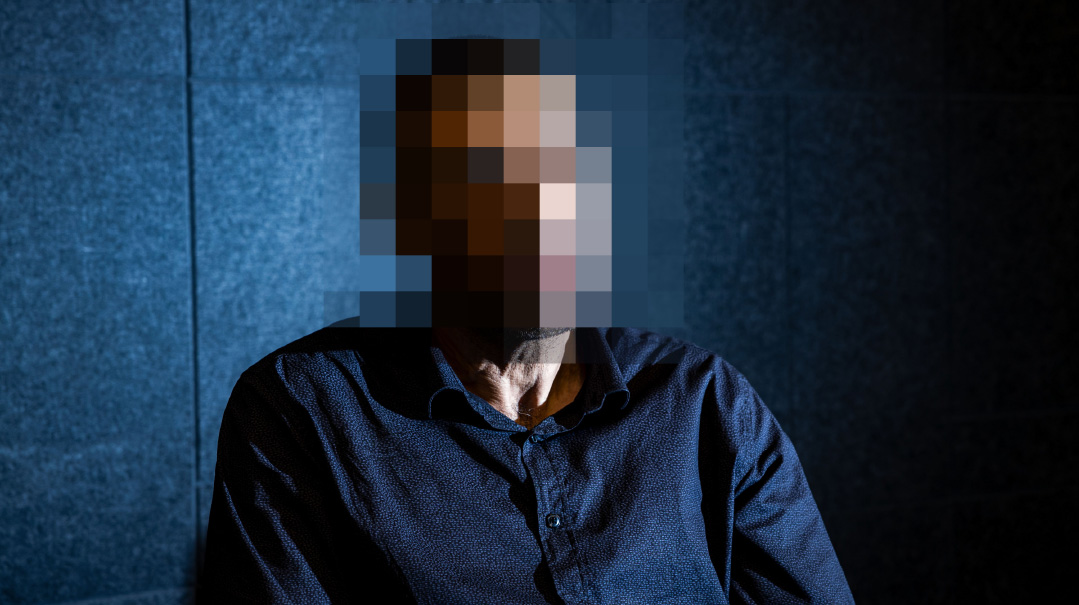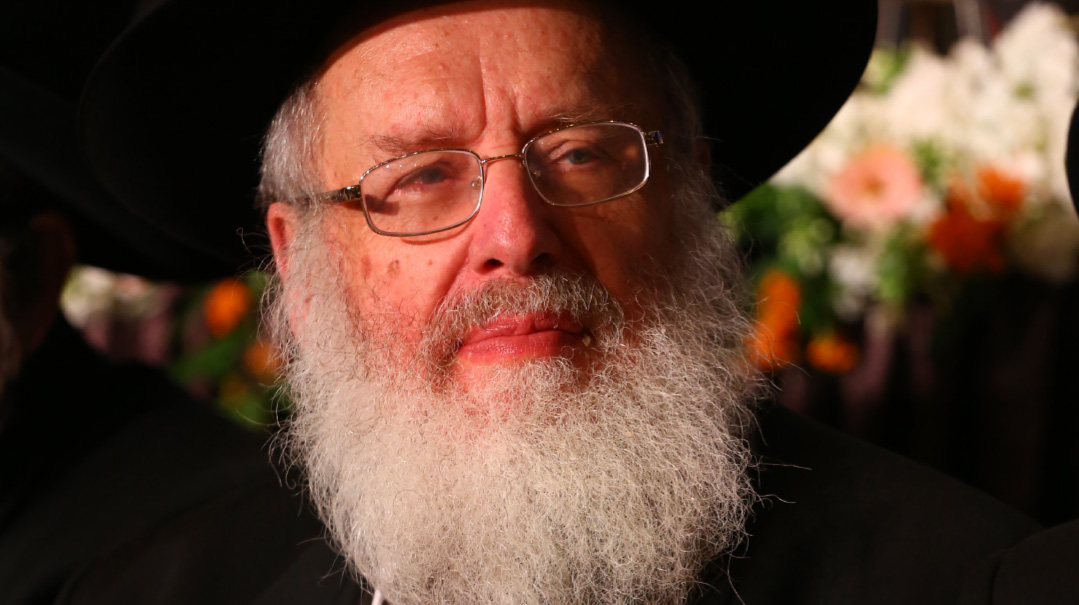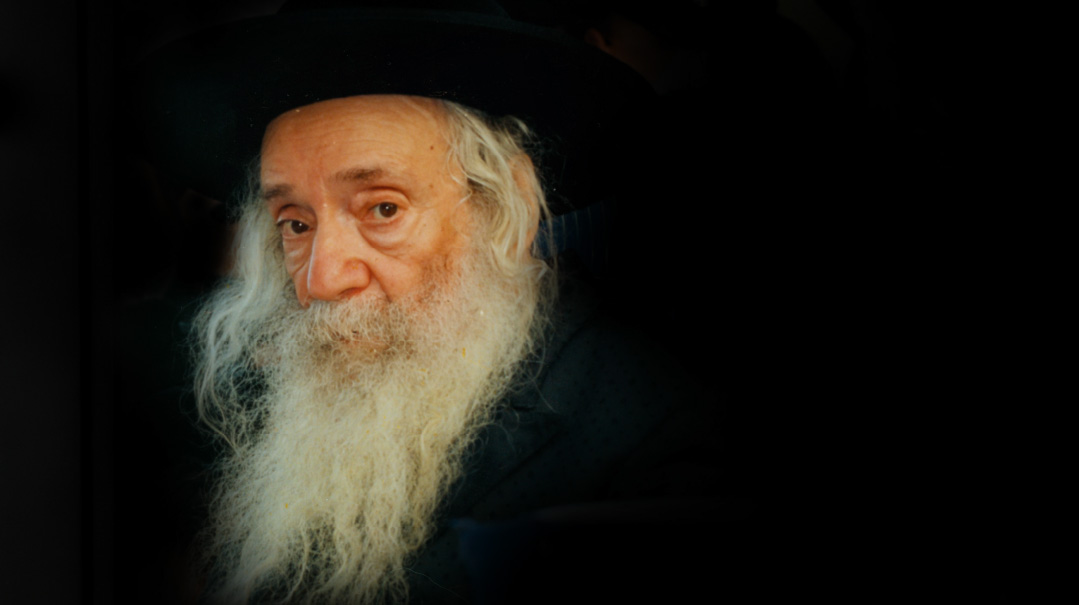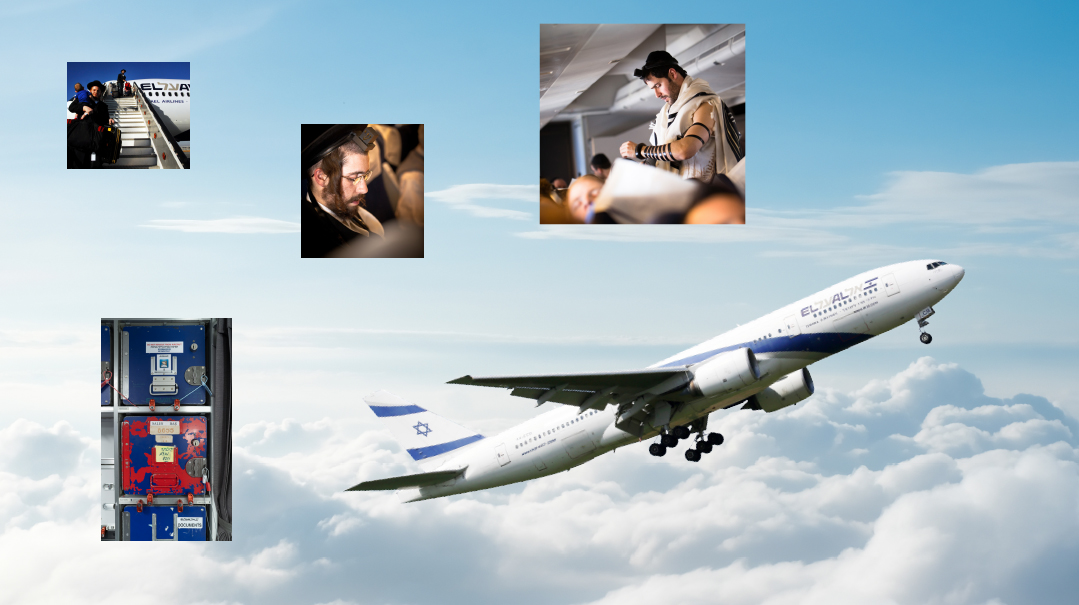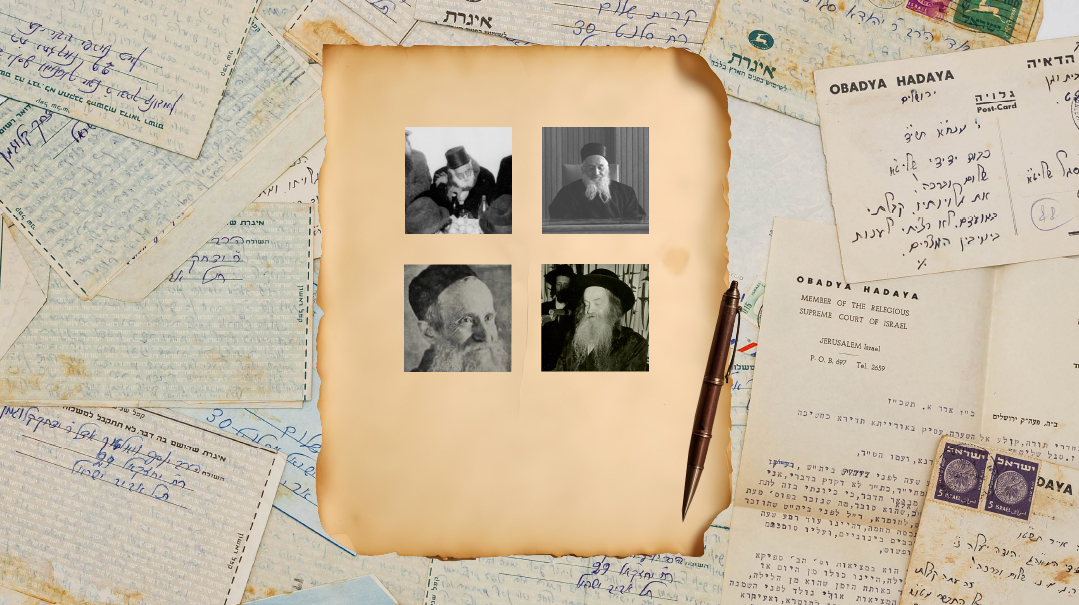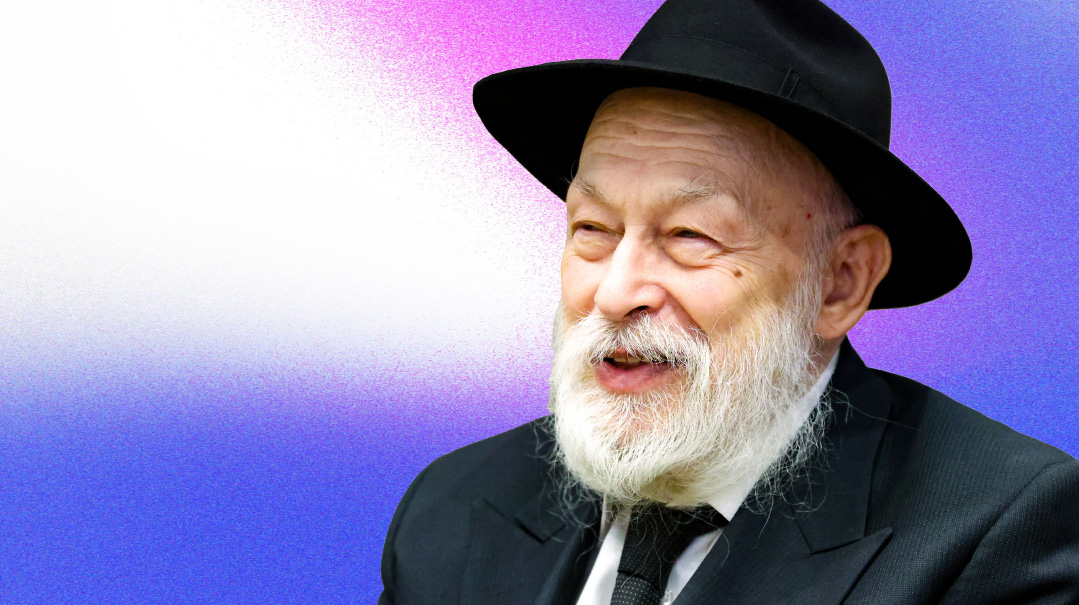Return the Deposit

Rav Meir Nachman Elchadad brings support and solace to another bereaved father
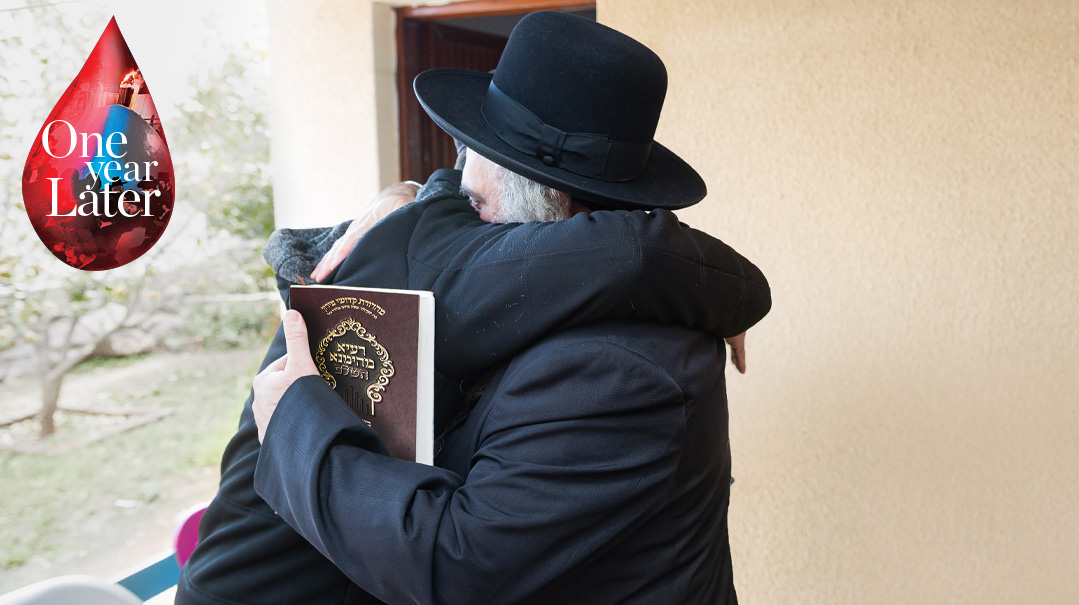
Photos: Elchanan Kotler
The pain in the room is so tangible you can almost touch it, burning in the flames rising out of the wicks floating in bowls of olive oil.
How do people cope after losing what’s most precious to them on earth?
Reuven Ben Eli, whose wife and three children were killed in a horrifying road accident last September, searches for the right words. “I can’t explain it,” he says finally. “It’s not possible to explain. This is strength that comes when the pain overwhelms you, and I can’t tell you how it happens.”
Rav Meir Nachman Elchadad, a Breslov mashpia who has been a pillar of strength to so many others after losing two sons in Meron last Lag B’omer, looks into Reuven’s eyes, communicating in a language understood only by fellow sojourners on this path of deep pain. “HaKadosh Baruch Hu gives special kochos,” he says. “On the pasuk from Eishes Chayil, ‘Noda bashearim baalah,’ the holy Zohar explains that this is a revelation of the emunah that HaKadosh Baruch Hu plants in each person’s heart. It’s a very personal, precise thing, and very deep inside the person.”
Rav Elchadad goes over to the bowl of olive oil and burning wicks, and tends to the lights. This is one of the things he taught Reuven Ben Eli — to prepare such candles for the neshamos. “Olive oil for a departed soul is like cold water in a desert,” he tells his friend.
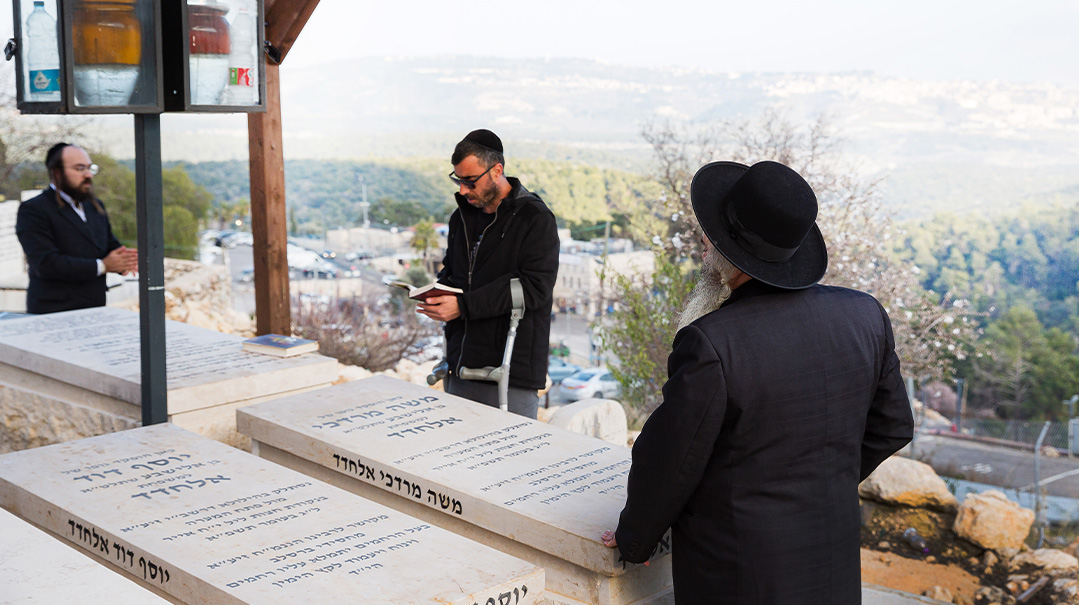
Through the Corridor
The bond between the Yerushalmi mashpia and the bereaved father and husband from the northern Israeli town of Ma’alot is one of rav and talmid. It’s also one of brothers navigating unthinkable tragedy.
It was less than half a year after the Meron disaster, in which Rav Elchadad lost his sons Yosef David (Seffie), 18, and Moshe Mordechai, 12. Throughout the shivah and beyond, Rav Elhadad and his wife were pillars of emunah and fortitude, an attitude they certainly instilled in their children as well.
When Rav Mendel Moskowitz of Tzfas — who was pushed underfoot by a crush of people and initially left for dead until a Hatzolah member eventually noticed him twitch — came to the shivah house in a wheelchair from the hospital, he told Rav Elchadad, “I was lying next to your Yosef David, I heard his Shema Yisrael and his ‘Abba, todah.’ His Shema kept me alive.”
The news on September 29, the day after Simchas Torah, was shocking. A bus carrying dozens of students on a post-Succos field trip in the north somehow swerved out of its lane and flipped over, injuring over 50 people — and smashing the car of the Ben Eli family of Ma’alot, who were on their way to a family simchah. Moran Ben Eli, 35, and her three children Dekel, Liam, and Anael, were killed instantly, as was the bus driver. Reuven was extracted alive from the smashed metal mass, and the following day, after regaining consciousness and being told of the loss of his entire family, was brought to the funeral on a stretcher, face bandaged, escorted by a team of ICU personnel.
That morning, Rav Elchadad was traveling with his son Shimon Yisrael, who suggested they attend the funeral and participate in the family’s grief.
They arrived at the same moment that Reuven, through his tears and pain medication, shouted as he faced four shrouded bodies, “This is what HaKadosh Baruch Hu wanted! This is what HaKadosh Baruch Hu wanted!”
Rav Elchadad was stunned. Such pure, unadulterated faith, even amid the searing pain. That was the beginning of a friendship, a relationship of teaching, yet also of mutual support and comfort. Since then, Rav Elchadad’s visits to the Ben Eli home in Ma’alot have become routine. I ask Rav Elchadad if I may join him on his next visit. I, too, want to have a taste of this rock-solid faith.
On the drive from Jerusalem to Ma’alot, Rav Elchadad tells me that today’s drive is really a return visit, because a few days earlier, Reuven Ben Eli came to his home in Jerusalem. He insisted on exerting himself — hobbling with crutches on his wounded legs — to slowly climb the four floors to the Elchadad home.
“These are not simple times for either of us,” Reb Meir Nachman points out, “but words of emunah are what give strength — knowing that everything in This World is temporary, that nothing lasts forever. Still, although we know the souls of our children are in the best possible place, that it’s good for them, the most challenging thing is to cope with the separation from the bodies, to cope with the excruciating yearning we feel here on earth.”
He talks about his conversations with Reuven, how they discuss gedolei Yisrael who faced tragedies and painful bereavement. “He is an honest person, a real straight shooter,” he says of Reuven, “and his wife was also special. She went to shiurim… Oy, without emunah, it is impossible to survive. Only emunah…”
Amid all the talk of emunah, I try to discern if Rav Elchadad is coping with the same challenge that he attributes to Reuven.
“Of course! Each of us has his challenges, and some of them change your life, but it’s precisely in the most painful places that you find Hashem — because there’s nowhere to run to.”
But, I ask, perhaps a bit irreverently, aren’t you also “angry” at Hashem?
“Chas v’shalom!” Rav Elchadad exclaims. “We know that He is good and does only good. We don’t always see the good that He has done and continues to do all the time, but we know it in our neshamos. This is the deep knowledge that every Yid has.
“We believe that our children needed to live in our home for precisely their allotted amount of time, and now they’re next to HaKadosh Baruch Hu — they have finished their tikkun. I don’t want to be egotistic and selfish by asking Hashem to send them back only because that is what is good for me. It is better for them over there. They have passed through the corridor.”
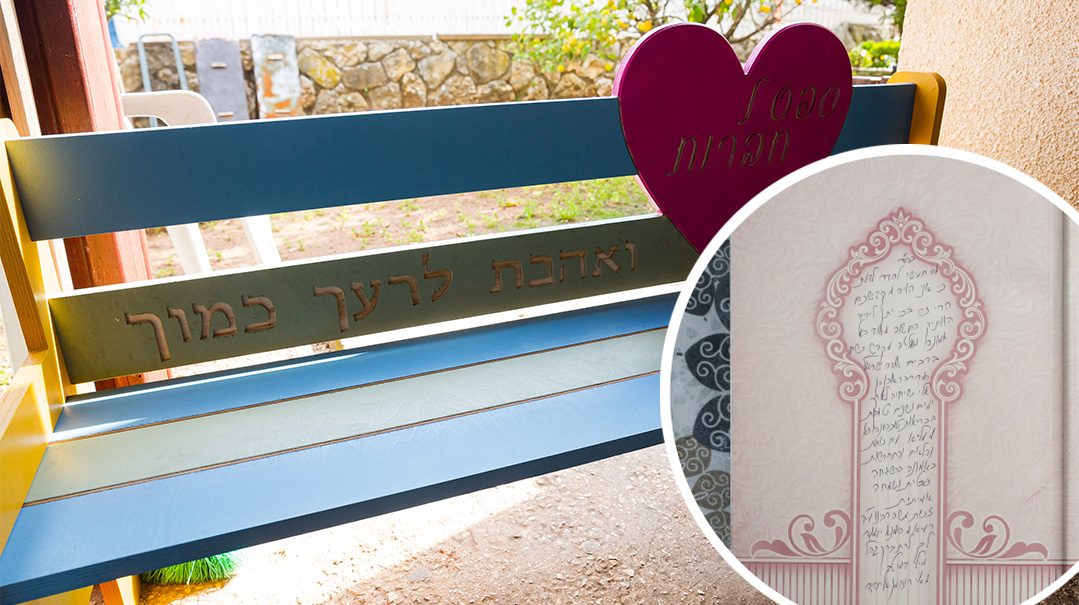
A “friendship bench” and a loving inscription. Helping to ease the pain is no contradiction to emunah
Stay with Life
Rav Elchadad mentions a funeral that took place 124 years ago in Baghdad. Rav Shimon Agassi, the talmid of the Ben Ish Chai, lost two of his sons, and then a third son who was soon to be married. The words of the Ben Ish Chai to his student are printed in a kuntres at the end of Bnei Aharon, his sefer on gilgulim.
“The Ben Ish Chai said there, ‘kol ra’amcha b’galgal,’ that when the passing of a person generates a thunder, a loud noise, that is the sod of the gilgul. He said that there are people who die young, and they needed to be in the world for this specific amount of time. When they finished their tikkun during that time, their neshamah is then elevated and ensconced On High.”
Rav Elchadad goes on to describe the famous, heartbreaking scene cited in the Gemara of that Shabbos in the home of Rabi Meir, whose sons passed away and whose wife Bruria hid them in the attic and covered them, so their father would not find out until after Shabbos. He reflects on that Shabbos in his home, seudah after seudah, until that moment when Rabi Meir asks, “Where are my two sons?” and his wife notes that perhaps they went to the beis medrash. Again, after Havdalah he asks, and again she answers, and he replies that he had not seen them in the beis medrash.
Then, after Melaveh Malkah, she asks her husband one question: A person came and gave me something for safekeeping, and now he came to take it. Should we return it or not? Rabi Meir replies that of course she should return it. Then she takes him up to the attic, removes the sheet that was covering them, and Rabi Meir bursts into bitter sobbing. At that moment she says to him, “Rebbi, did you not just tell me that we have to return the deposit to its Owner? Hashem gave and Hashem took, may Hashem’s Name be blessed…” And with these words he is comforted.
Rav Elchadad is quiet for a few minutes and then says, “The Ben Ish Chai asks, why did he find comfort in those words? Because she was telling him that the neshamah is a gilgul of a pikadon, a deposit, in the body. The neshamah is placed in the body, and the Owner of that deposit is Hashem Yisbarach. Know that the Owner of the deposit has come to take it back. They needed to live this period of time in this world — they finished their tikkun and returned to their source. This is what she reminded him.”
Rav Elchadad is certainly a fount of emunah, yet if you look for the pain, it’s right there, radiating in his eyes.
“Emunah is not a contradiction to pain,” he says. “Hashem created humans to hold emotions. But we need to know that with the pain and the distress, at the end of the day, someone who has emunah will have a life. Someone who has no emunah will find that his life is not life.”
He recounts those horrific moments outside the Abu Kabir Forensics Institute, where he traveled in order to identify the bodies of his children and bring them back to Meron for burial.
“Outside Abu Kabir was a non-Jew waiting to identify a relative who had been killed in a car accident. This man kicked and cursed and broke things — he had totally lost it. And then there were the dozens of family members of Meron victims, also in shock and horror, but a Jew is born with emunah. Of course, there are levels, but deep down, everyone has it. And this is the work — to refresh it every single day in order to keep it accessible.”
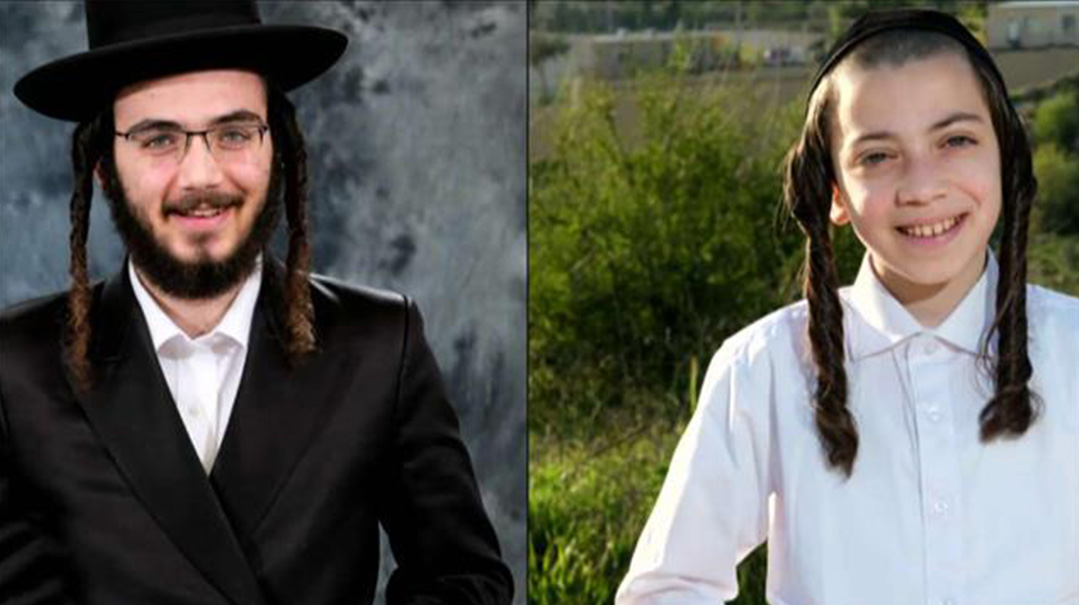
Yosef David (left) and Moshe Mordechai. “Although we know the souls of our children are in the best possible place, the biggest challenge is to cope with the separation from the bodies, to cope with the excruciating yearning we feel here on earth”
Stick to the Plan
As we reach the Ben Eli home in Ma’alot, we notice many benches in the yard, and the smell of fresh paint. Reuven is holding a paintbrush and painting the benches in a rainbow of inviting colors.
The minute Reuven sees Rav Elchadad, he gets up and hobbles over on his crutches, his eyes coming to life with a special sparkle. They speak for a few moments, and then Reuven tells me about his project, the “friendship benches.”
It’s actually a variation on a project that was initiated in Canada and other places around the world — a special, safe place in a playground where children can go when they feel overwhelmed, in a silent signal that they need companionship or comfort.
“Sometimes children feel sad in school, and all they need is a hug, a smile, and someone to give them support,” he says. “These benches, painted in colors that are meant to soothe and bring happiness, are made for them. A child who feels like he’s struggling is taught that he can sit on the bench, and his friends are taught that this means he needs their support and care.”
Together with the Ma’alot municipality, Reuven has also initiated the creation of an educational playground, with equipment that will provide a platform for learning that’s both stimulating, fun, and — like the friendship benches — promotes sensitivity and healthy social interaction.
Entering Reuven’s house, the first thing I notice is the bookcase, filled with bookmarked sifrei kodesh, a testimony to his new life, post-accident. On the table is a sefer that Rav Elchadad was instrumental in publishing, with a personal inscription on the first page: “To my chashuve friend, with tremendous emunah, who is mekadesh Sheim Hashem in public, the ohev Yisrael Reb Reuven Ben Eli…” This is followed by a list of brachos for genuine joy, yeshuah, and good health, and everything a person needs.
Reuven has already prepared the table for his friend’s arrival. “Brachos for an illui neshamah,” he announces.
“Yes,” Rav Elchadad adds. “The neshamos have gone back to their places, and whatever we merit to do here as an elevation for their neshamos arouses merits for them.”
“B’ezrat Hashem,” Reuven replies. “We should always have the strength to keeping doing.”
Reuven isn’t a big talker, but he speaks about those first days in the hospital, when Rav Elchadad came to visit him after attending the levayah.
“I was in a haze,” he relates, “and although so many people enveloped me, when I was left alone, I felt like it was just me and Hashem. I had a type of… of… until now, I feel it.” He hugs himself to illustrate the feeling he had from Hashem.
“It’s a closeness that I cannot describe,” he says. “Like a Divine hug. You know, from the moment of the accident, as soon as I regained consciousness, it was clear to me that it is Hashem. There is nothing else. I have no explanation. I simply knew it was Him. And like I knew that it is from Him, I knew that He is also giving me strength and enveloping me.
“Today, I see things that I didn’t see in the past. As Jews, we always have an attachment to Hashem, but I never did too much in order to taste this tremendous thing of Torah and emunah, and today I thank Him for every day that I am alive.” He thinks for a minute. “I’m a miracle,” he adds.
“And may we soon merit to see the plan, that this is exactly how it was meant to be,” says Rav Elchadad. “Because there’s a plan for everyone. Although we don’t usually see it, every day HaKadosh Baruch Hu shows a person what his plan is. There was a Moroccan elder who, when asked, ‘What’s doing?’ would answer, ‘Baruch Hashem, everything is according to the plan.’ They asked, ‘Which plan?’ and he replied, ‘Every person has a plan that he slowly discovers.’
“Reuven, anyone who witnessed the accident or saw the scene can’t understand how you emerged alive. You were practically scraped off the asphalt. When Hashem wants someone to live, He takes him alive out of a totaled car.”
“It’s true,” says Reuven. “I am a miracle.”
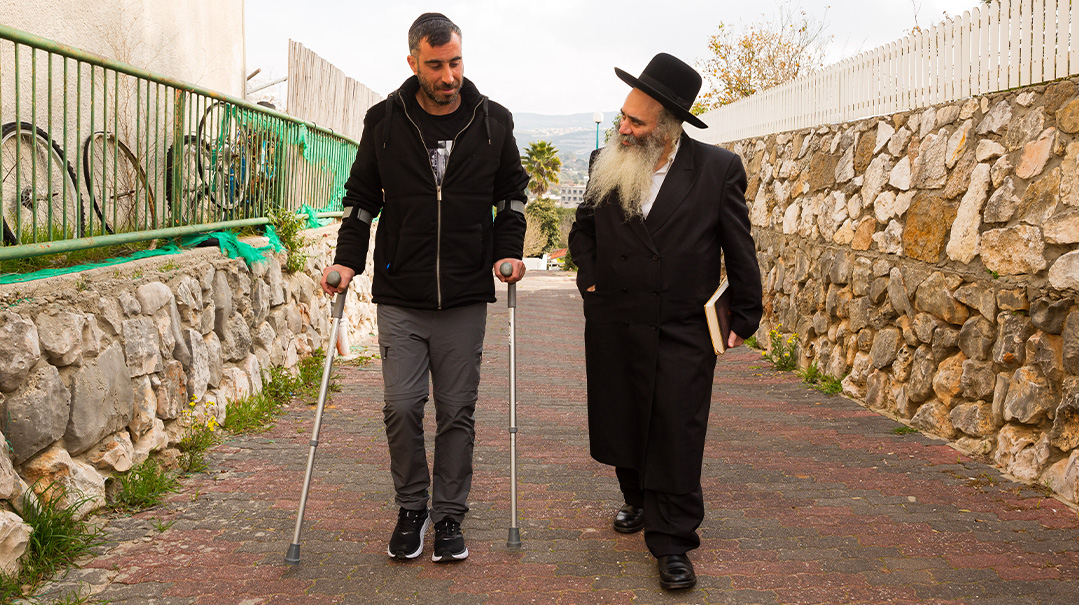
Until the Geulah
Today’s plan, at least according to Rav Elchadad who has brought candles with him, is to go with Reuven to the gravesites of his wife and three children, and then proceed to Meron, to the graves of the two Elchadad boys. But then Reuven declines — he says that he has not emotionally prepared himself enough for a visit to his departed family today.
And so, we decide to skip this stop, not to make it more emotionally taxing for Reuven. But as we prepare to leave for Meron, Reuven again decides to decline.
“I don’t want to make it inconvenient for you,” he says. “You see, I have to travel the long way — since the accident, I haven’t traveled on Highway 89, the way to Meron from here, where the crash happened. I take a more roundabout route. You shouldn’t have to bother to take the longer route just because of me.”
But Rav Elchadad is happy to accommodate. He leaves his car in Ma’alot, and Reuven drives us to Meron — the long way.
I live in Karmiel, not too far from Churfesh, where the crash occurred, and I happened to pass by the site of Reuven’s accident. I still remember watching the bus that had flipped over being towed away. And I will never forget that smashed car. My heart was shattered by the sight of a little girl’s dress shoes and a little pink bag alongside the flattened frame. The driver’s seat was so mangled that at the time I couldn’t fathom how anyone survived.
And now, just a few months later, Reuven has not only survived, but is driving again. He makes one request, though: not to speak of the accident while he drives. That’s more than he can handle. As we near the spot where it all happened, instead of going straight, he turns off. “I need to take an alternate route, even today,” he says. “I still can’t face the memories.”
The courtyard of the tziyun Rashbi always has its own special energy, but we continue up higher, to a new chelkah in the small cemetery. There, with the tziyun of Rashbi in the background and the mountains of Meron and Tzfas on the horizon, Rav Elchadad’s sons are buried. Over their gravesite, someone has built a wooden roof — Rav Elchadad tells me that the one who took care of it is a Yid who found himself during those fateful moments unable to move, and his legs were on top of Rav Elchadad’s younger son. This was one small thing he could do to honor the neshamos.
Rav Elchadad adjusts the huge olive oil candles, while an American yeshivah bochur asks him for a brachah.
A few minutes later, when they’re alone, Reuven stands next to Rav Elchadad as the Rav addresses his children by name and speaks to them.
“I came here with Reuven ben Rachel, a Jew who also went through a nisayon, whose wife and children passed away… Daven that HaKadosh Baruch Hu give him strength and emunah to withstand the challenge until the Geulah, until techiyas hameisim. He should have happiness in his heart, he should be stronger, so that he can give chizuk to others, b’ezras Hashem; he should always be happy and have a reason to be happy… And we should hold on until the Geulah,” he pleads tearfully.
They stand there, two hearts with huge gaping holes, embracing and raising their eyes to the Heavens with an acceptance that doesn’t mitigate the pain, as they say, “It is all You. You’re the One who gives, You’re the One who takes — and You are the only One who can bring the Geulah.”
(Originally featured in Mishpacha, Issue 910)
Oops! We could not locate your form.

